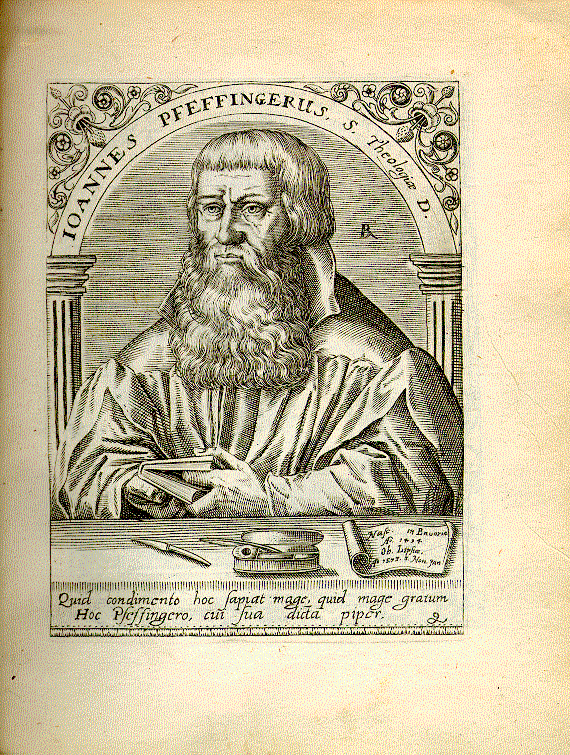- Johann Pfeffinger
thumb|right|Johann_Pfeffinger_from_the_Jean-Jacques Boissard , 1669] Johann Pfeffinger (27 December 1493 ,Wasserburg am Inn –1 January 1573 , inLeipzig ) was a significanttheologian andProtestant Reformer .Devoting himself to the religious life, he became an
acolyte atSalzburg in 1515, and soon afterward was made subdeacon and deacon. Receiving a dispensation from the regulations concerningcanonical age , he was ordained priest and stationed atReichenhall ,Saalfelden , andPassau , where his clerical activity soon found great approbation. Suspected ofLutheran heresy, he went toWittenberg in 1523, where he was cordially welcomed byMartin Luther ,Philip Melanchthon , andBugenhagen .In 1527 he went as parish priest to
Sonnenwalde ; and in 1530, when expelled by thebishop of Meißen , he removed to the monastery ofEicha , near Leipzig, where his services were attended by many outside the parish. In 1532 he went toBelgern , whence he was delegated, in 1539, to complete the Reformation in Leipzig. In 1540, he was permanently vested with the office of superintendent.He declined calls to Halle and
Breslau , though he took part in completing the work of the Reformation atGlauchau in 1542. In his capacity of censor he prevented further printing ofSchenk 'spostilla . In 1543 he was graduated as the first Protestant doctor of theology, and became a professor of theology in the following year. In 1548 he was made a canon of Meissen.Duke
Maurice of Saxony drew him into the negotiations regarding the introduction of a Protestant church constitution and liturgy. Having been appointed assessor in the Leipzig consistory in 1543, he participated, in 1545, in the consecration of abishop of Merseburg as one of the ordaining clergy. In the following year he negotiated at Dresden withAnton Musa andDaniel Greser , and took part in the deliberations concerning the Interim at theDiet of Meissen (July, 1548), atTorgau (October 18 ), atAltzella (November), and at the LeipzigSaxon Diet (December 22 ). The Elector August likewise sought formal expressions of opinion from Pfeffinger; and in this connection, in 1555, he proposed, with a view to securing religious uniformity, that the Interim liturgy of 1549 should again be used. Melanchthon, however, opposed this suggestion, holding that, were it adopted, additional religious disunion would follow.Pfeffinger also took part in the deliberative proceedings of the delegates of the three consistories in 1556, as well as in the Dresden convention of 1571. Pfeffinger's writings were ethical, ascetic, and polemic. His Propositiones de libero arbitrio (1555) occasioned the outbreak of the
synergistic strife. AgainstNicolaus von Amsdorf he wrote his "Antwort" (Wittenberg, 1558), "Demonstratio mendacii" (1558), and "Nochmals grundlicher Bericht"; while he opposedMatthias Flacius in his "Verantwortung." He embodied his tenets in five articles of the "Formula der Bekendnus" ofJune 3 ,1556 , which he also submitted, in amplified form, to the Wittenberg theologians.References
*
Wikimedia Foundation. 2010.

